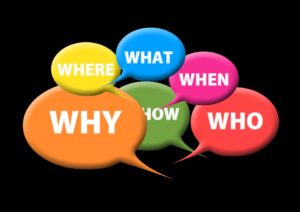
In last week’s post I discussed how communication is the exchange of information between two or more people. This week’s post focuses on the importance of questions not only to solicit the specific information you seek, but the way in which well-crafted questions can create the space for an engaging conversation. Asking questions can establish rapport, spark another’s interest or curiosity, break new ground, or position your own interest in learning what people around you think.
Here are some tips in asking questions effectively:
- Ask! First of all, don’t be afraid to ask questions! Sometimes shyness, concern over making a mistake or inappropriate question, or fear of being perceived as a nuisance can keep us from asking questions. While some subjects are not appropriate for conversation in the early stages of any relationship, there’s nothing wrong in asking questions per se. Be curious about people —if you’re genuinely interested in a person, you won’t run out of things to ask.
- Ask open-ended questions. There are two kinds of questions based on the scope of the answers they elicit: closed and open-ended questions.
- Closed questions are those answerable by a simple yes or no. Example: “Are you happy with today’s presentation?”
- Open-ended questions, on the other hand, are those that require a qualified response. They are usually preceded by who, when, where, what, how, or why. Example: “What is it about today’s presentation that you find most engaging?”
- Open-ended questions are more effective than closed questions because they evoke thoughtful consideration of the subject and creative thinking.
- Ask purposeful questions. We ask questions for different reasons, and it is important that we are aware of our purpose in doing so, to help us frame those questions better, and keep them relevant.
For example, we can ask questions with the goal of putting the other person at ease. Questions like these should be phrased in a pleasant, non-threatening manner, and involve subjects that the other person is likely to be interested in. Example: “I see that you are wearing a (sports team) cap! Do you follow them?”
Some questions are designed to challenge the other person’s thinking, and encourage a lively debate or deliberation. Questions like these should be phrased in a way that is focused and process-oriented. It can also challenge existing assumptions about the subject matter. Example: “How do you think a leader can better motivate his team?”
At other times, questions are meant to encourage a person to join an existing discussion. The goal of these questions is to invite participation, as much as to gain information. Example: “I find Sandra’s approach very refreshing. What do you think, Frank?”
For more effective communication, be prepared to listen and ask questions that create opportunities for learning and understanding. Think of what your partner in conversation needs at the current stage of your relationship, and ask him or her questions that can address that need. And then stop, slow down and listen.
___________________________________________________________________________________
John Whitehead, coaches individuals and organizations in becoming more effective by helping them improve their interpersonal communications, emotional intelligence and resiliency.
*******Are you wondering if having a Leadership/Personal Development Coach is right for you? Contact John for a complimentary, exploratory coaching session at [email protected]********
If you would like to get notifications for when I post, please go to my blog site and register. I promise I will not spam or use your email address for anything else. You can visit and register for my blog at https://johnkwhitehead.ca/blog-2/
